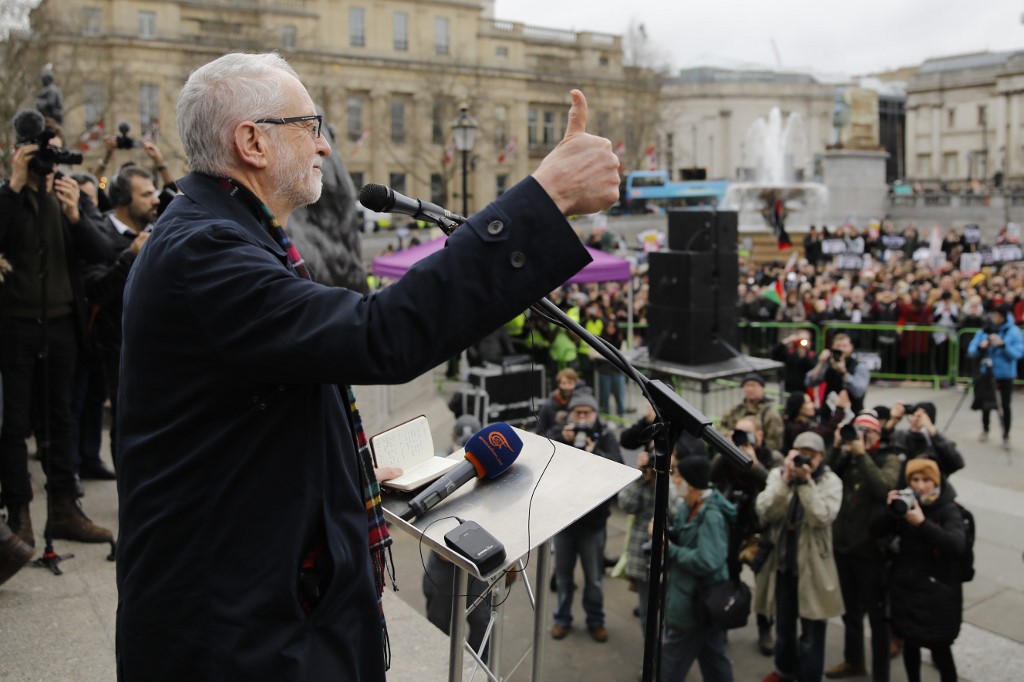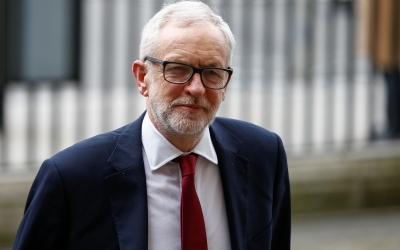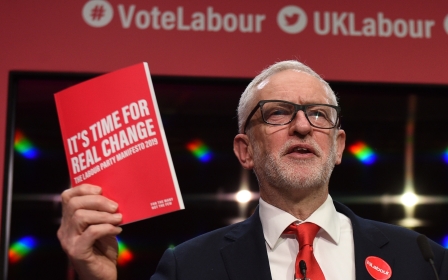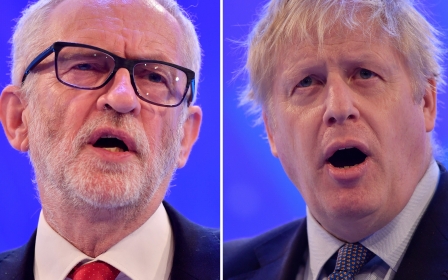Jeremy Corbyn's exit: Farewell to a friend of Palestine
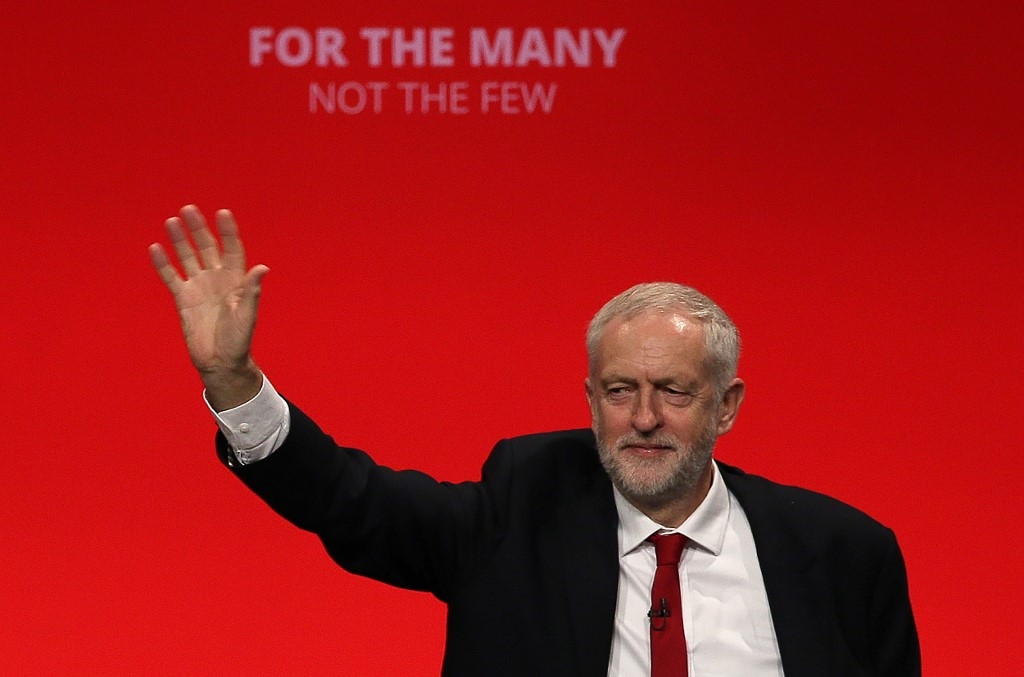
Jeremy Corbyn ended his tenure as Labour leader on 4 April. It did not help that the event was overshadowed by the Covid-19 pandemic, but even so, his departure went largely unmarked and unmourned.
Like Shakespeare’s assassinated Julius Caesar: “Now lies he there. And none so poor to do him reverence.” It was a demeaning end to five years of unjustified vilification. His enemies were legion, and many felt free to criticise him in the crudest terms.
Jeremy Clarkson, the Grand Tour TV host, scoffed at Corbyn for not knowing how to shave or get himself a pair of glasses that fitted. When Labour lost the 2019 general election, Piers Morgan derided Corbyn as a “loser”, saying: “You lost the fight. Pipe down.”
Political assassination
So much scorn has been heaped on Corbyn over the years of his leadership that his political reputation, and any claim he had to the country’s respect, have been systematically trashed. By the end, the very idea that such a failure could succeed as a leader of any political party was unthinkable. No less than Caesar’s, it was a political assassination so thorough as to rule out all hope of recovery.
For Palestinians, though, it was a different story. His departure from the political main stage is nothing short of a tragedy. It means the loss of a man of principle - the first, and possibly the last, British political leader with the conscience to recognise Britain’s historical betrayal of the Palestinian people, and the moral responsibility to put it right.
There are lessons here for the new Labour leader and his team, but the signs are not promising. They seem to have opted for the old, failed appeasement route
The sight of a hall full of delegates waving the Palestinian flag at the 2017 Labour conference was unforgettable, as was Corbyn’s speech pledging his determination to end Israel’s occupation of Palestinian land and the suppression of its people.
As Britain’s prime minister, Corbyn would have made political history for being the first Western political leader to champion the Palestinian cause publicly and unequivocally. His agenda for addressing Israel’s illegal occupation and confronting its oppressive rule in Palestine might even have shamed hitherto inert European states into adopting it with him. What a joyous prospect for a people consistently passed over in favour of Israel’s priorities.
'Antisemitism' propaganda
We were not to rejoice for long. Corbyn’s support for Palestine, for the poor and oppressed everywhere, was a major reason why he and the Labour left had to be stopped.
While much has been made of the capitalist establishment’s role in Corbyn’s downfall due to his socialist economics, it was the pro-Israel lobby that dealt the final blow. The idea that a British prime minister would one day promote the Palestinian cause to the world must have seemed the stuff of nightmares.
Persistent campaigning by this lobby since 2016 - largely mediated by the Zionist Jewish Labour Movement, the pro-Israel Board of Deputies of British Jews and Labour Friends of Israel, and likely coordinated by the Israeli embassy - achieved its aim. From a famously honourable, anti-racist campaigner who had spent a lifetime fighting for the underdog, Corbyn was transformed by this propaganda into a racist and antisemite; it is now received wisdom that his party is “institutionally antisemitic”, an accusation it will struggle to shake off.
There are lessons here for the new Labour leader and his team, but the signs are not promising. They seem to have opted for the old, failed appeasement route.
In January, before either Keir Starmer or his deputy leader had even been elected, the majority of Labour leadership and deputy leadership candidates unhesitatingly adopted the Board of Deputies’ “10 pledges” on antisemitism. These will hold the party leader to account for their implementation, blur the lines between anti-Zionism and antisemitism, and permit unprecedented outside intrusion into Labour’s training and disciplinary procedures.
Incompatible positions
Starmer went further, making antisemitism a core issue for his leadership of Labour and repeatedly condemning its allegedly antisemitic record. On the day he became leader, he sent an abjectly apologetic letter to the Board of Deputies, promising to “root out” Labour’s “antisemitism”. One wonders if, by these actions, he hopes to win over the lobby. If so, he may find, as Corbyn did, that such zealous appeasement will not insure him against its further demands if he steps out of line.
Where does that leave Palestinians post-Corbyn? Starmer is a member of Labour Friends of Palestine and agrees with the two-state solution. He opposes Trump’s peace plan and has appointed Lisa Nandy, an avowed supporter of Palestinian rights, as shadow foreign secretary. At the same time, he also calls himself a supporter of Zionism “without qualification”, and says he believes in the State of Israel.
These positions are incompatible: to support Palestinian rights, which include self-determination and the right of return, is to negate Israel’s legitimacy as an exclusive state for Jews in Palestine, and vice versa. Starmer’s confused positions cannot work.
In apartheid South Africa, it was not possible to support apartheid and also black rights, and the conflict only ended with apartheid’s abolition. The same holds true for Zionism in Palestine. Terminating Zionism is the only way to a permanent peace.
These are uncomfortable ideas for Starmer and all Western politicians. They would prefer to persist with the myth of a Palestinian state living “alongside Israel”, so as to avoid confronting the true situation. Better still, get rid of men like Corbyn, who might expose the reality and lead the way to a fairer future for long-oppressed peoples.
As Shakespeare might have said: “Here was Corbyn! When comes such another?”
The views expressed in this article belong to the author and do not necessarily reflect the editorial policy of Middle East Eye.
Middle East Eye propose une couverture et une analyse indépendantes et incomparables du Moyen-Orient, de l’Afrique du Nord et d’autres régions du monde. Pour en savoir plus sur la reprise de ce contenu et les frais qui s’appliquent, veuillez remplir ce formulaire [en anglais]. Pour en savoir plus sur MEE, cliquez ici [en anglais].



